- Home
- Anne Mather
Hell Or High Water Page 4
Hell Or High Water Read online
Page 4
‘Summers at King’s Green are so peaceful,’ she declared,obviously trying to change the subject. ‘I’m afraid you may find them too peaceful, Mr Manning.’
‘Strange as it may seem, I’m looking for that kind of peace, Mrs Chase,’ he retorted in the curiously harsh tones of someone driven to defend himself. ‘Unlike Margot, I find London lacking in stimulation, and I anticipate the coming summer with more enthusiasm than I’ve anticipated anything for—years.’
‘This summer?’ Helen heard the note of anxiety in her mother’s voice as she reached the open doorway. ‘Oh, but—I—er—’
Her words trailed away at her daughter’s appearance, and there was genuine relief in her expression as she rose from the sofa. ‘There you are, Helen,’ she exclaimed weakly. ‘I was beginning to wonder where you had got to.’
‘Sorry.’ Helen forced a polite smile that encompassed her mother and Margot, but only touched the outline of the man who rose courteously from the armchair he had been occupying. ‘Is lunch almost ready?’
‘Not—er—not until you’ve shown Mr Manning the house, dear,’ declined Mrs Chase firmly, her eyes flashing messages only Helen could interpret. ‘I—er—I should start upstairs, and Margot and I will walk in the garden. Do you think that’s a good idea, Mr Manning?’
‘If your daughter has no objection,’ he essayed, inclining his head, and Helen saw that he was not smiling now.
Silently she led the way across the hall and up the shallow stairs to the first floor. She was conscious of him behind her, of Margot’s antipathy at her exclusion, but she determinedly ignored the personalities involved, and began her recitation.
‘The house was originally begun in the reign of Queen Anne, but its completion was at a much later date. Since then, of course, various alterations and additions have been made, and some major structural repairs were carried out in the late nineteeth century. Its design was partly attributed to a man called Nicholas Hawksmoor, a contemporary of Vanbrugh, who as you know designed Blenheim Palace, and Castle Howard in Yorkshire, but we don’t think it likely, and the fact that it took so long to complete takes it out of his lifetime. The name—King’s Green—isattributed to the fact that in the early nineteenth century, when my great-great-grandfather was alive, the Prince Regent was reputed to have stayed here, on his way to Bath, but again—’
‘Can we cut the thesis?’ Jarret Manning’s cool tones were as incisive as his words. ‘I realise showing me around your home is obviously distasteful for you, and believe me, I can do without the guided tour.’
Helen was too stunned to answer him, and ignoring her offended expression, he opened the door to their left. ‘A bedroom, right?’ he suggested, glancing about its generous proportions. ‘Very nice. Next?’
Pressing her lips together, Helen showed him all the bedrooms on the first floor, including her own, although she had made sure to put all her belongings away so that nothing should signify that this room was hers more than any of the others. The adjoining bathrooms she left to him, saying only that some of the bedrooms had been made over when the plumbing was modernised.
‘There is a second floor,’ she added stiffly, after he had admired the master suite which was presently unoccupied. ‘We don’t use it, so I expect it may be very dusty, but it’s habitable if one needs more rooms.’
‘I don’t expect to,’ Jarret remarked dryly. ‘I see you have some central heating. I hope it wasn’t installed when the Prince Regent came to visit.’
‘No. It was installed after the second world war—’ began Helen seriously, and then stopped when she realised what he had asked. The fact that he had caught her out so easily was irritating, and she indicated the narrow passage that led to the second floor staircase with evident resentment.
‘Don’t you ever relax?’ Jarret enquired, accompanying her back along the gallery to the first floor landing, and when she didn’t answer this, added: ‘I suppose these lighter patches on the walls are where your—great-great-grandfather’s paintings used to hang, is that right?’ indicating the oblong squares visible between the panelled doors. ‘What happened? Are they in storage, did they fall to pieces—or have they been sold?’
‘I imagine you know the answer to that, Mr Manning,’Helen declared stiffly, disliking his perspicacity. ‘Had we a valuable collection of paintings to sell, we would hardly be selling the house, would we?’
‘Not to a philistine like me, no,’ he agreed solemnly, and she glanced sideways at him, sure that he was mocking her again.
‘Why do you want King’s Green, Mr Manning?’ she demanded, halting at the head of the stairs. ‘It—it’s not your—your scene really, is it? Don’t you want a—a pad nearer town?’
He grinned at this, an outright humorous grin that unexpectedly reacted on her like a blow to the solar plexis. She had reluctantly admitted his attraction before, but she had had no idea how irresistible his smile might be. Now, with the lighter creases beside his eyes deepening to reveal laughter lines, and the thin lips parting over slightly uneven white teeth, he was devastating.
‘Oh, Helen!’ he gulped, and the suppressed amusement in his voice briefly distracted her from the realisation that he had used her name. ‘How would you know what my—scene is? And as for my having a pad—God!’ He shook his head, and adopting a distinctly Bogart-like accent, added: ‘Stick to your own territory, sweetheart!’
Helen felt a second’s overwhelming impulse to giggle, but then common sense came to the rescue, and the awareness of what she was doing here and his part in it sobered her instantly.
‘I don’t know what you mean, Mr Manning,’ she affirmed, with all the contempt she could muster. ‘Shall we go downstairs?’
‘In a minute…’ He, too, had sobered, and as she moved to the head of the stairs his cool fingers closed about her arm. They successfully prevented her from moving away from him, and within their grasp she was conscious of his nearness and the disturbing magnetism his smile had generated. ‘Tell me something,’ he said, his thumb massaging her flesh almost without his being aware of it, ‘what did I do to arouse so much resentment? I didn’t ask to come here. I was invited. I was given the obviously mistaken impression that your mother wanted to sell thehouse, but if she doesn’t then I shan’t lose any sleep over it, Miss Chase.’
Helen held up her head. ‘I—why—my mother does want to sell the house,’ she admitted unwillingly.
‘And you don’t?’
‘It’s not my house to sell.’
‘But if it were?’
Helen moved her shoulders helplessly, avoiding those blue eyes which seemed to have the cutting strength of steel. ‘I—I expect I might have to,’ she conceded, and with an exclamation he let her go.
‘But not to me,’ he inferred coldly, and she turned away from him to descend the stairs without giving him a reply.
Several rooms opened off the hall below. The drawing room, the music room, the dining room, the library—Helen did not know which to choose after their contretemps upstairs, and she waited for him to join her before making a decision. Jarret, however, seemed in no hurry to continue, and she had to wait some minutes while he examined the carving on the balustrade.
‘Grinling—’ began Helen reluctantly, only to have him interrupt her words.
‘—Gibbons. Yes, I know,’ he finished sardonically. ‘Only Gibbons died in 1720, so how do you account for that, if the house wasn’t completed until much later?’
Helen’s face flamed. No one had ever questioned the authenticity of the carving before, and it was disconcerting to have him do so. It was true that the likelihood of Gibbons having completed the carving was in some doubt, and her father’s assessment had been that it had probably been a pupil of Gibbons who accomplished the work.
‘I—it’s open to speculation that—that perhaps it was a pupil of Gibbons who completed the carving,’ she admitted. ‘But the style is his, and that’s what’s important.’
‘Is it?’ He descended the
final few stairs to stand beside her. ‘A connoisseur might disagree with you.’
Helen tilted her chin, annoyed that she still had to look up to him, despite her five feet six inches. ‘Are you a connoisseur, Mr Manning?’ she enquired as coolly as she could, and the humour in his expression annoyed her almost more than his sarcasm had done.
‘You obviously don’t think so,’ he said, pushing back his hair with lazy fingers, his eyes far too knowing for her peace of mind. ‘Shall we go on?’
As he had already seen the drawing room, Helen opened the doors into the dining room, standing back as he passed her to walk thoughtfully round the well-proportioned room. The panelled window embrasures overlooked the gardens at the side of the house, and attracting as it did the early sun, it provided a warm oasis on colder mornings. It had always been one of Helen’s favourite rooms, and she waited with some reluctance for his verdict. It was an elegant room, the beige walls hung with panels of moiré silk, the carpets, with their distinctive design, brought back many years ago from the Caucasus. Much of the furniture was not original, however, although the dinner service residing in the long serving sideboards was Worcestershire porcelain. Ruched curtains framed long windows, and were matched in the deep blue cushions of the chairs that faced one another across the hearth.
‘Do you use this room often?’ Jarret queried, indicating the damask cloth and silverware which Mrs Hetherington had laid ready for lunch, and Helen hesitated.
‘If—if you mean, do we give many dinner parties nowadays, the answer is no,’ she replied at length, watching him push his hands into the pockets of his pants, unwillingly aware of the strong muscles of his thighs. ‘I—er—the room is used by—by the family most days.’
‘The family?’ He arched his brows.
‘My mother and me.’
‘Ah!’ He nodded his head. ‘I gather you have no brothers or sisters.’
‘No.’
‘And your father’s dead.’
‘Yes.’
Helen resented this interrogation, but she didn’t see how she could refuse to answer him, and with an obvious gesture she stepped back into the hall. It was another few seconds before he joined her, and her features had set in controlled lines. It was as if he was deliberately delaying her, and she wished her mother or Margot would appear and take this unwanted duty from her.
‘The music room,’ she declared shortly, throwing open the white panelled doors that led into a smaller, but equally attractive room. Here, one or two pictures still adorned the walls, portraits mostly, of long-dead Chases, whose likenesses would be of little value to anyone else. The carpet was Chinese, the grand piano reflected the warmth of the bowl of primroses that adorned it, and several pieces of eighteenth century mahogany gleamed with the patina of age. There was a small escritoire, a folding, gate-legged table, and a walnut bracket clock, whose ticking filled the quiet room with a steady rhythm.
‘Do you play the piano—Miss Chase?’ Jarret asked, strolling towards the stringed instrument which dominated one corner of the room.
‘I used to,’ she admitted, her words clipped and unwilling, and with a wry smile he seated himself at the piano and ran his long fingers over the keys.
At once she recognised the melody of a popular tune of the day, mellowed to a lilting refrain that tugged at the heartstrings. Then, just as she was considering making the scathing comment that he was abusing the age of the instrument, he switched to a Chopin prelude, and drew the very soul from the poignant phrase.
His eyes sought hers as he finished with a final sweep of the keys, and feeling obliged to say something, she tried not to sound as if she was envious. ‘You’re very accomplished,’ she averred, glancing meaningfully towards the doors again, and his rueful grin denoted his acknowledgement of how reluctant she had been to compliment him.
‘Faint praise?’ he murmured, as he passed her into the hall, and she closed the doors behind them with a distinctive click.
The library was a cooler room, having the benefit of the north light, but seldom welcoming the sun. Nevertheless, the book-lined walls were warming, and the desk set squarely before the windows was an ideal place for anyone to work.
‘Did your father use this room?’ Jarret asked casually, wandering over to the desk and running his fingers over its tooled leather surface.
‘Yes.’
As always, Helen was non-committal, but this time Jarret persisted. ‘What did he do—your father?’ he asked, propping himself against the side of the desk and folding his arms. ‘A country gentleman, was he? The local squire? Or did he have to work for his living like the rest of us?’
Helen was shocked into speech. ‘I don’t think my father’s affairs are anything to do with you, Mr Manning,’ she declared, preparing to make her exit, but his next words arrested her.
‘As I see it, there has to be some reason why you dislike me so much, Miss Chase,’ he observed pleasantly. ‘I’d like to know what it is, that’s all.’
‘And—and you think learning about my father’s occupation will help you?’ she exclaimed.
‘Let’s say I’m interested in your background, as you’re obviously interested in mine.’
‘What do you mean?’
‘Oh, come on…’ He rested his chin on his chest, looking up at her through the thick length of his lashes. ‘You think I’m coarse and uneducated, thoroughly unsuitable to own King’s Green!’
Helen’s lips worked silently for a moment, then she said: ‘When my father inherited King’s Green, we owned the land for—for miles around. He—he was the squire, yes, but he worked hard for the estate, and only the high cost of living and the taxes he had to pay forced him to sell most of it.’
‘I see,’ Jarret nodded, but Helen had to disabuse him.
‘However,’ she went on, ‘if you think I—I object to—to you because I think you’re socially inferior, you couldn’t be more wrong!’
‘No?’
‘No!’ Helen swallowed before continuing. ‘What—what I do object to is—is Margot Urquart bringing her—her boy-friends here and pretending that they have the money to buy a place like this!’
She realised she had gone too far long before Jarret’s dark features mirrored his contempt. She didn’t know what had possessed her to speak so candidly, unless it was his scornful comments about her father. She did know practically nothing about him, after all, and although shesuspected Margot was helping to finance his property speculation, she had no way of proving it.
‘So that’s what you think,’ he commented flatly, his lips curling with dislike. ‘My, my, what a devious little mind you have, to be sure! You really think I would let Margot buy me a country retreat?’
Having gone so far, Helen had no choice but to go through with it if she wanted to save her self-respect. ‘Why not?’ she asked now, lifting her shoulders. ‘She’s bought everything else, hasn’t she?’
He was off the desk and confronting her before her shaken senses could acknowledge her mistake. He had been close before, when he had detained her at the top of the stairs, but not as close as this, nor breathing down upon her with all the fiery ferment of his anger. His breath was not unpleasant, and it was flavoured by the Scotch her mother must have offered him, but its heat was unmistakable, combined as it was with the ice-cold glitter of his eyes.
‘You little—’ His harsh tones cut off the expletive with brutal vehemence, and Helen, who had never suffered such an assault before, shrank back in alarm. ‘What the hell do you think gives you the right to pass moral judgment on me, or Margot? What is it to do with you how we live or how we act? And if Margot chooses to spend her money in a way that suits her best, why should she have to defend herself to you?’
Helen shifted unsteadily under his gaze, momentarily numbed by the fierceness of his attack. ‘I—I—I don’t care what Margot does, as—as long as she doesn’t expect—us to—to condone it,’ she stammered, struggling to recover her dignity. ‘And—and intimidating me isn
’t going to make me—change my mind, Mr Manning,’ she added bravely.
‘No?’ Unexpectedly his eyes dropped to the modest neckline of her dress, and it was all she could do to prevent herself from clutching the collar about her throat. ‘Then perhaps I should give you a sample of what you’re missing, mmm?’
Helen gulped. ‘Don’t you dare—’ she began chokingly, and then felt her words stifled at the source as his mouth descended over hers.
He held her, his hands gripping her shoulders without respect or gentleness, the narrow fingers digging into her soft flesh. She was not crushed against him, but she was aware of the hard strength of his lean body, and ridiculously embarrassed by the pressure of his legs against hers. She had never been kissed in anger before, never experienced the wholly possessive abrasion of raw emotion, and while her mind repulsed the savagery of his embrace, her senses swam beneath the undoubted skill of his expertise. He was no callow youth, attempting to seduce her with clumsy force, but an experienced man, making her fully aware of his needs—and her own. And that was the most upsetting thing of all. Until this moment she had not known she possessed such needs, or that she could be aroused in quite this fashion. It shed a whole new light on the prospect of her marriage to Charles, and with the remembrance of her fiancé, sanity asserted itself.
With a superhuman effort she wrenched herself away from Jarret Manning, and summoning all her strength she raised her arm to deliver the slap he deserved. But although he was gazing at her with a curiously speculative frown marring his lean features, he had obviously not been as emotionally disturbed by what had happened as she was, and when she tried to slap him he parried the blow without effort.
‘You—you—’ she began impotently, and he offered: ‘Cad?’ with mocking raised eyebrows. ‘Yes! Yes!’ she cried, unaware that her rounded breasts were rising and falling with the intensity of her anger, and were drawing his attention to their delectable promise.
However, he seemed to think better of any further incursion, and rubbing the back of his hand across his mouth, as if to assure himself he was not exhibiting some betraying trace of her lipstick, he gestured with mock-politeness towards the door: ‘Shall we continue?’

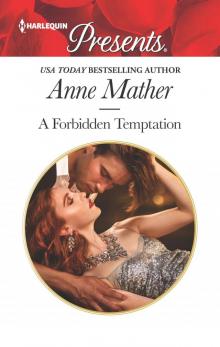 A Forbidden Temptation
A Forbidden Temptation Dark Castle
Dark Castle Hell Or High Water
Hell Or High Water Jake Howard's Wife
Jake Howard's Wife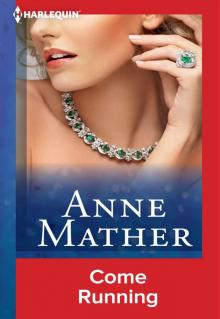 Come Running
Come Running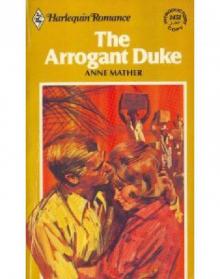 The Arrogant Duke
The Arrogant Duke Sweet Revenge
Sweet Revenge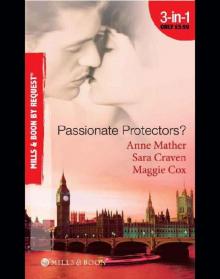 Passionate Protectors?
Passionate Protectors?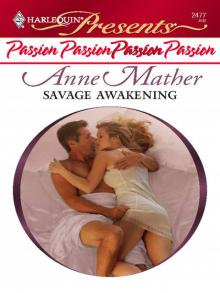 Savage Awakening
Savage Awakening Come the Vintage
Come the Vintage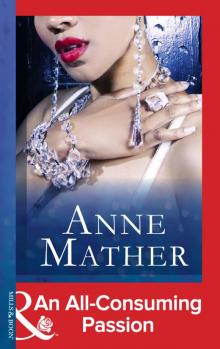 An All-Consuming Passion
An All-Consuming Passion A Fever In The Blood
A Fever In The Blood The Shrouded Web
The Shrouded Web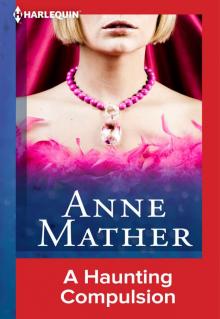 A Haunting Compulsion
A Haunting Compulsion Duelling Fire
Duelling Fire Edge of Temptation
Edge of Temptation Wild Enchantress
Wild Enchantress The Brazilian Millionaire's Love-Child
The Brazilian Millionaire's Love-Child Captive Destiny
Captive Destiny The Pregnancy Affair
The Pregnancy Affair The Sanchez Tradition
The Sanchez Tradition A Passionate Affair
A Passionate Affair Sinful Truths
Sinful Truths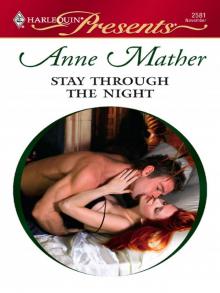 Stay Through the Night
Stay Through the Night Seen by Candlelight
Seen by Candlelight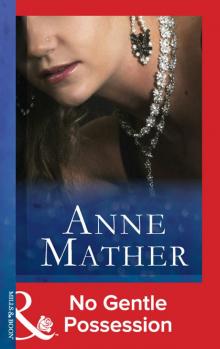 No Gentle Possession
No Gentle Possession His Forbidden Passion
His Forbidden Passion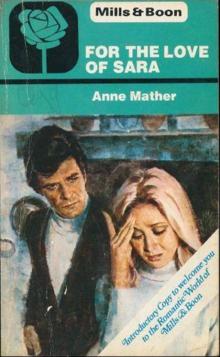 For the Love of Sara
For the Love of Sara A Trial Marriage
A Trial Marriage Melting Fire
Melting Fire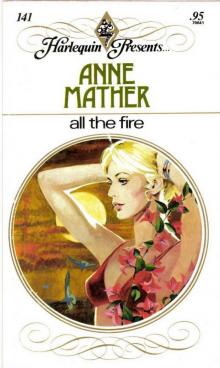 All The Fire
All The Fire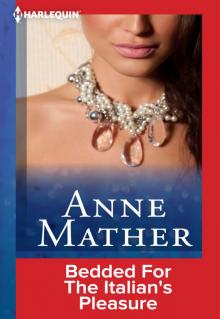 Bedded For the Italian's Pleasure
Bedded For the Italian's Pleasure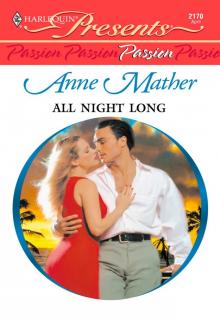 All Night Long
All Night Long The Japanese Screen
The Japanese Screen Rich as Sin
Rich as Sin Smokescreen
Smokescreen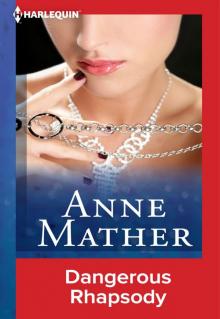 Dangerous Rhapsody
Dangerous Rhapsody Brittle Bondage
Brittle Bondage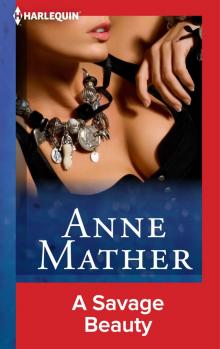 A Savage Beauty
A Savage Beauty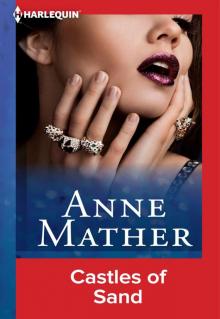 Castles of Sand
Castles of Sand A Distant Sound of Thunder
A Distant Sound of Thunder THE VIRGIN'S SEDUCTION
THE VIRGIN'S SEDUCTION White Rose of Winter
White Rose of Winter Proud Harvest
Proud Harvest The Legend of Lexandros
The Legend of Lexandros Country of the Falcon
Country of the Falcon Diamond Fire
Diamond Fire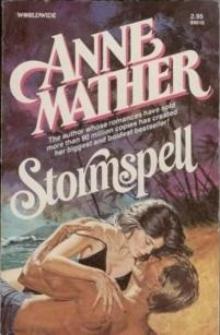 Stormspell
Stormspell Legacy of the Past
Legacy of the Past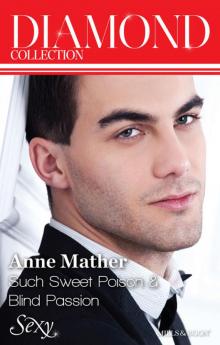 Such Sweet Poison/Blind Passion
Such Sweet Poison/Blind Passion The Baby Gambit
The Baby Gambit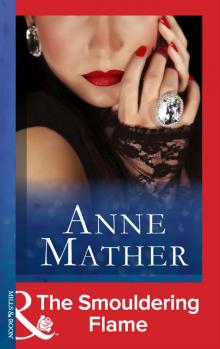 The Smouldering Flame
The Smouldering Flame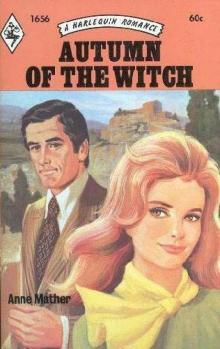 Autumn of the Witch
Autumn of the Witch Rachel Trevellyan
Rachel Trevellyan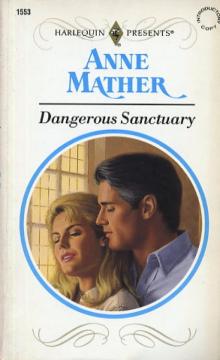 Dangerous Sanctuary
Dangerous Sanctuary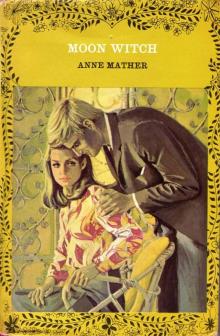 Moon Witch
Moon Witch An Heir Made in the Marriage Bed
An Heir Made in the Marriage Bed Images Of Love
Images Of Love Innocent Obsession
Innocent Obsession Tidewater Seduction
Tidewater Seduction Pacific Heat
Pacific Heat Take What You Want
Take What You Want The Spaniard's Seduction
The Spaniard's Seduction The High Valley
The High Valley A Woman of Passion
A Woman of Passion The Reluctant Governess
The Reluctant Governess Charade in Winter
Charade in Winter Mendez’s Mistress
Mendez’s Mistress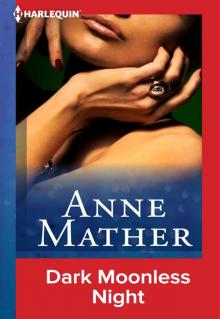 Dark Moonless Night
Dark Moonless Night The Greek Tycoon's Pregnant Wife
The Greek Tycoon's Pregnant Wife The Autumn of the Witch
The Autumn of the Witch Night Heat
Night Heat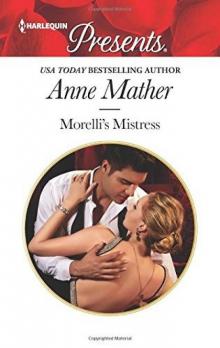 Morelli's Mistress (Harlequin Presents)
Morelli's Mistress (Harlequin Presents) Jack Riordan's Baby
Jack Riordan's Baby Beware the Beast
Beware the Beast Born Out of Love
Born Out of Love Greek Affairs in his Bed: Sleeping with a StrangerBlackmailed into the Greek Tycoon’s BedBedded by the Greek Billionaire
Greek Affairs in his Bed: Sleeping with a StrangerBlackmailed into the Greek Tycoon’s BedBedded by the Greek Billionaire Green Lightning
Green Lightning Guilty
Guilty Snowfire
Snowfire Moondrift
Moondrift Stolen Summer
Stolen Summer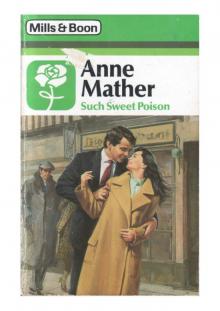 Such Sweet Poison
Such Sweet Poison Dark Venetian
Dark Venetian Innocent Sins
Innocent Sins Baby Out of the Blue
Baby Out of the Blue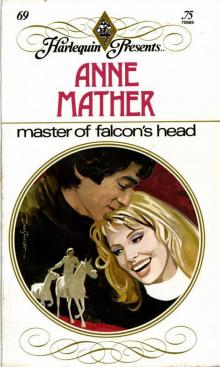 Master of Falcon's Head
Master of Falcon's Head Rooted in Dishonour
Rooted in Dishonour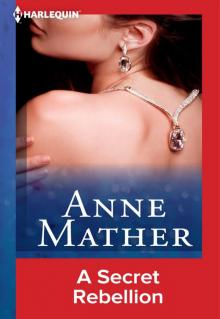 A Secret Rebellion
A Secret Rebellion The Forbidden Mistress
The Forbidden Mistress Dangerous Enchantment
Dangerous Enchantment The Judas Trap
The Judas Trap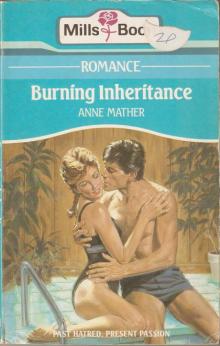 Burning Inheritance
Burning Inheritance Forbidden Flame
Forbidden Flame Who Rides the Tiger
Who Rides the Tiger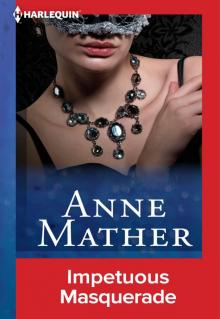 Impetuous Masquerade
Impetuous Masquerade Fallen Angel
Fallen Angel Act of Possession
Act of Possession Dangerous Temptation
Dangerous Temptation Pale Dawn Dark Sunset
Pale Dawn Dark Sunset Dark Enemy
Dark Enemy Innocent Virgin, Wild Surrender
Innocent Virgin, Wild Surrender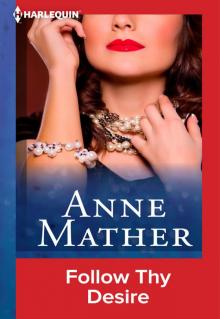 Follow Thy Desire
Follow Thy Desire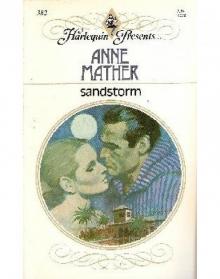 Sandstorm
Sandstorm Apollo's Seed
Apollo's Seed Whisper Of Darkness
Whisper Of Darkness A Wild Surrender
A Wild Surrender A Dangerous Taste of Passion
A Dangerous Taste of Passion The Night Of The Bulls
The Night Of The Bulls Hot Pursuit
Hot Pursuit The Longest Pleasure
The Longest Pleasure An Elusive Desire
An Elusive Desire Storm In A Rain Barrel
Storm In A Rain Barrel